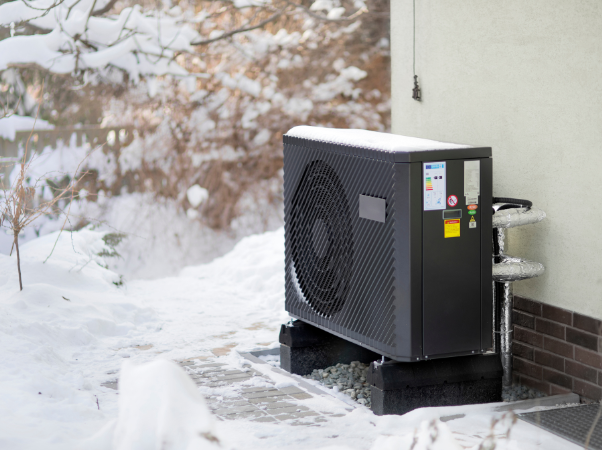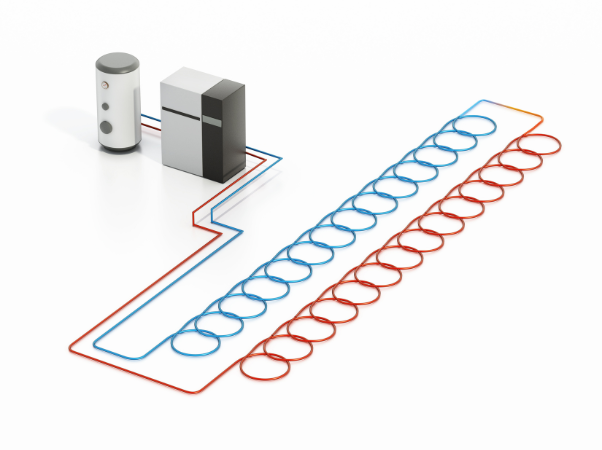 Free delivery on orders over £75 ex VAT
Free delivery on orders over £75 ex VAT Free click & collect from branches nationwide
Free click & collect from branches nationwideGround Source Heat Pump Installer Guide
Commercial and residential properties alike are increasingly turning towards ground source heat pumps as an economic and environmentally friendly alternative to traditional heating systems.
Installers with the experience and knowledge required to fit these systems can take advantage of this increasingly popular new technology.

Ground source heat pumps are an advanced alternative to traditional heating systems. They enable users to generate usable, renewable heat via pipes buried underground, which can result in much lower fuel bills and emissions.
How do Ground Source Heat Pumps work?
Ground source heat pumps work on the same principle as air source heat pumps, however their heat is gained from pipes in the ground instead of the air. This heat fuels the refrigeration cycle, allowing the heat pump to effectively transfer heat into the property.
Thermal transfer fluid (a mixture of antifreeze and water) flows through a loop of pipe buried underground - usually under a garden or other outdoor space. Natural heat from the ground is absorbed into the fluid, which fuels the refrigeration process in the heat pump. This then raises the temperature of the refrigerant and transfers that heat to the property through a heat exchanger.

Installing Ground Source Heat Pumps
In order to conduct an effective survey and carry out a quality installation, professionals must be fully accredited by the Microgeneration Certification Scheme (MCS) in order to install ground source heat pumps. This certification provides complete installer training and industry conduct compliance.
In addition to the MCS, becoming a member of REAL (Renewable Energy Assurance Ltd) can promote installers as trustworthy, qualified, and experienced when it comes to renewable installations.
When installing ground source heat pumps, heat loss calculations must be conducted meticulously. This is so the heat pump can be sized correctly for the property, resulting in efficient and effective heating.
The size of the ground collector is also important. The ground collector must be long enough to satisfy the demands of the heat pump, however installers must ensure that adequate space is available so the ground does not freeze as heat is extracted.
For more detailed information on ground source heat pump installation and to take your installation business to the next level, take a look at our partnered renewable training courses.
Types of Ground Source Heat Pump
The first and most important consideration when installing a ground source heating system is the method of extracting heat from the ground. This is typically achieved through either a ground loop or boreholes, although large bodies of water may also be suitable (though this is rare).
- Ground loop heat pump systems - Ground loop systems are most commonly used to gather heat from the earth. This method will require a large area of land for the loops, which are laid in trenches, and the ground conditions must also be considered.
- Borehole heat pump systems - For installations where horizontal space is limited, boreholes can be drilled to gather heat vertically. This tends to be more expensive than ground loop systems, as a thermogeological survey will have to be conducted beforehand and specialist equipment will be required to dig deeper.
- Note: Larger houses will require more than one borehole. Boreholes vary in depth between 50-200 metres, depending on the heat demand of the property.

Designing the Perfect Ground Source Heat Pump System
The initial design and planning stages of a ground source heat pump system can be the difference between an ultra-efficient renewable system, and one that struggles to keep up with demand.
MCS regulations state that any heat pump must be able to cover 100% of a property’s heat loss without requiring backup heating for 99% of the year.
The Renewables team at City Plumbing boasts an unrivalled knowledge of ground source heat pumps and other renewable technologies. With years of knowledge and a wealth of project experience under our belt, our know-how can be hugely beneficial for installers looking to fit the most effective system available.
We can identify the best renewable solution for any type of property, taking into account age, space, heat loss, emitters, and much more.
More importantly, we can recommend the right equipment, manufacturers, and accessories needed to enable a cost-effective, fuss-free installation.
Learn More and Become MCS-accredited with City Plumbing and GTEC
We've partnered with GTEC to offer MCS-accredited training to take your renewable installations to the next level.
Learn how to install Solar, Air Source & Ground Source Heat Pumps, EV Chargers, and all other main types of renewable technology. Become certified to upskill your business and take advantage of increased demand ahead of net zero.


